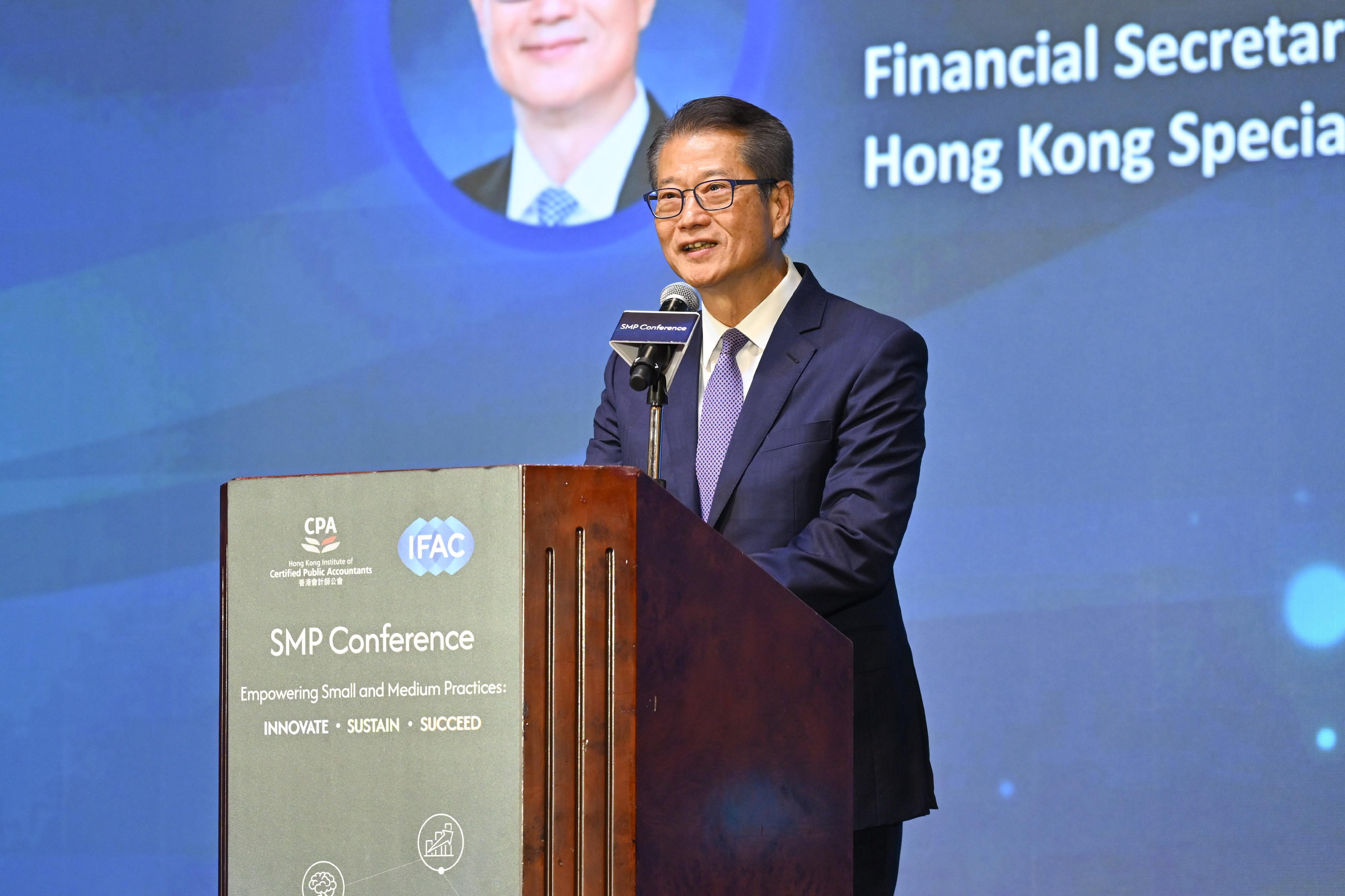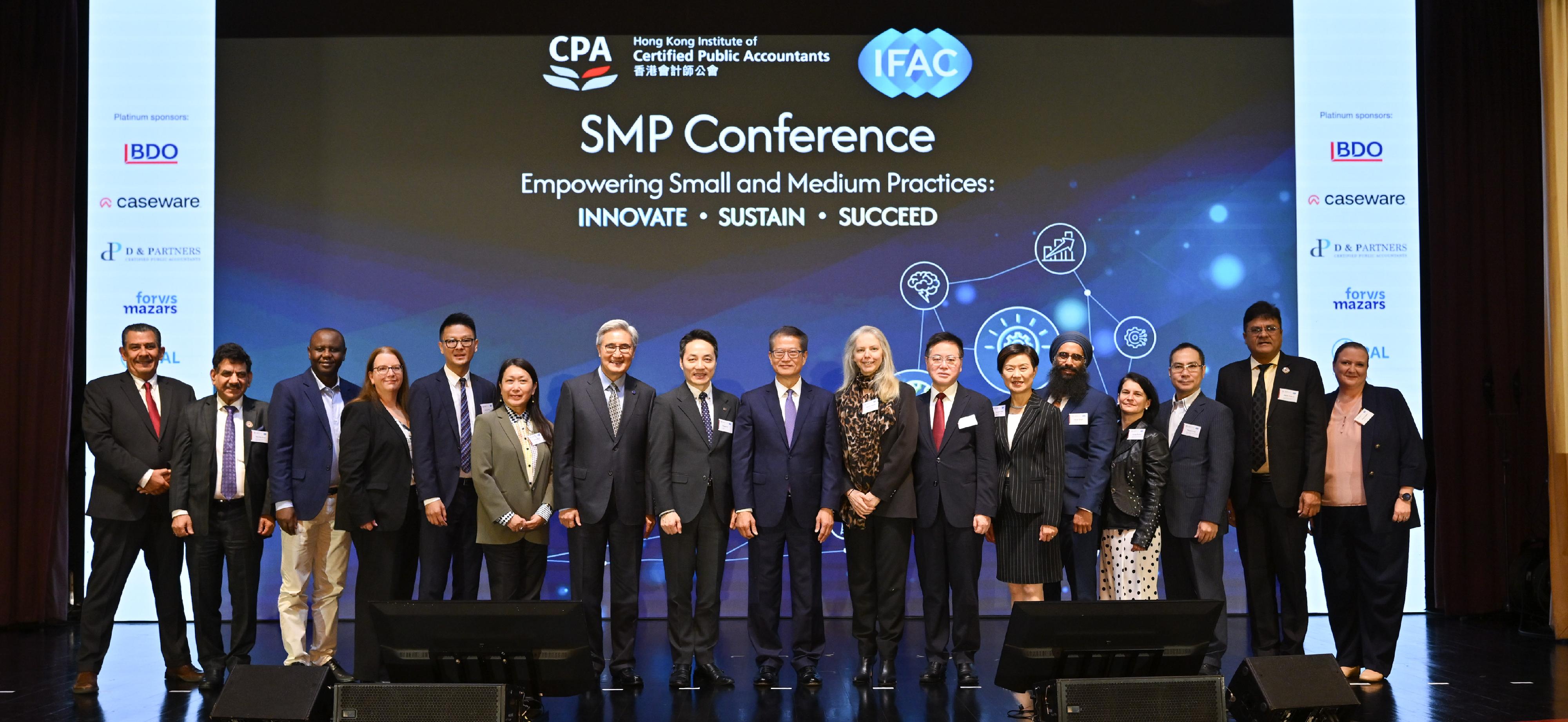Speech by FS at HKICPA x IFAC SMP Conference (English only) (with photos)
*************************************************************************
Edward (President of the Hong Kong Institute of Certified Public Accountants, Mr Edward Au), Ms Monica Foerster (Chair of the Small and Medium Practices Advisory Group of the International Federation of Accountants, Ms Monica Foerster), David (Chairman of the Accounting and Financial Reporting Council, Dr David Sun), Margaret (Chief Executive & Registrar of the Hong Kong Institute of Certified Public Accountants, Ms Margaret Chan), fellow members, ladies and gentlemen,
Good morning. It is my pleasure to join you at this important conference, co-organised by the HKICPA (Hong Kong Institute of Certified Public Accountants) and the IFAC (the International Federation of Accountants), highlighting the critical role that small and medium practices (SMPs) play—not only in our economies, but also in fostering the trust that underpins our financial system and business environment.
SMPs are an important pillar of the accounting profession across the globe. Known for their adaptability and close client relationship, they serve as trusted service providers and advisors to countless businesses, particularly small and medium enterprises (SMEs). However, in this era of daunting climate change and rapid technological transformation driven by artificial intelligence and others, how can the accounting profession, especially SMPs, navigate and thrive? And as the momentum of these global transformative forces continue to build up, how can SMPs evolve to seize the emerging opportunities?
These are timely and pertinent questions that this conference will explore. I very much look forward to hearing the insights and perspectives of the distinguished speakers and participants. On this occasion, I would also like to share the Hong Kong Special Administrative Region Government's perspective – including what we are doing both at the macro level and specifically with the accounting sector, to drive digital transformation and sustainability.
Digital transformation
Let me start with digital transformation. In today's age of innovation, few forces are as disruptive and transformative as artificial intelligence. AI is reshaping business models, redefining competitiveness, and revolutionising how we work, communicate and live. Fully recognising its enormous potential, Hong Kong has embraced a twin-engine vision – namely, developing "AI as a core industry", and promoting AI as an enabler (i.e. AI+) to transform and upgrade traditional sectors and businesses. Our focus spans six strategic pillars: supercomputing power, algorithm, use case scenarios, data, funding, and talent.
On the regulatory front, we are equally committed to ensuring a sound and supportive governance framework for responsible AI development. For example, in the financial sector, we have issued a policy statement on the ethical and responsible application of AI. It sets out a "dual track" approach: promoting adoption while addressing risks such as cybersecurity, data privacy and intellectual property protection.
Like any technologies, AI brings both challenges and opportunities to SMPs. While there are understandable concerns about AI's impact on reduced traditional client assignments and employment, we believe that greater opportunity lies ahead – how SMPs can evolve from traditional compliance-focused roles, into more strategic advisory capacities to support businesses in their transition and sustainable growth.
By leveraging technology to automate routine compilation and analytical processes, SMPs can redirect valuable resources toward higher-value services – such as ESG (environmental, social and governance) advisory and reporting, scenario contemplation, disaster recovery, and cybersecurity assessments. These are areas where their expertise can make a bigger difference.
Upskilling is key. I'm glad to note that here in Hong Kong, the AFRC (Accounting and Financial Reporting Council) and HKICPA have been working to empower SMPs with training and resources to build digital readiness. The Government is fully committed to supporting these capacity-building efforts, and we welcome deeper and broader collaboration with both local and international partners.
Sustainability
The second pillar is sustainability — a global imperative that is transforming business practices, lender perspectives and investor expectations worldwide.
At the macro level, Hong Kong is firmly committed to achieving carbon neutrality by 2050. We are advancing on four fronts: net-zero electricity generation, energy efficient, green buildings and transport, and waste reduction.
But our ambition goes further. We aim to establish Hong Kong as an international green technology and green finance hub – serving not only the city but the wider region. Today, Hong Kong is Asia's leader in green and sustainable finance, with over US$80 billion in green and sustainable debt issued last year.
Our green tech ecosystem is also gaining global traction. Yesterday, I returned from a business trip to Saudi Arbia. On this occasion, I led a 40-strong delegation, comprising Hong Kong and Mainland companies engaged in AI and robotics, biotech, fintech, green and sustainable tech, construction technologies, new materials, and more. Several of the tech companies from our delegation signed co-operation agreements or MOUs with local partners to deploy their solutions there.
Ladies and gentlemen, sustainability is no longer optional. It is becoming a must worldwide. The International Sustainability Standards Board (ISSB) is setting a new global baseline for corporate disclosure, in response to the growing demand for transparency from investors, regulators and consumers.
In December last year, we launched a roadmap on sustainability disclosure in Hong Kong , which charts a path for major public interest entities to fully adopt the ISSB standards by 2028. The ultimate objective is to provide a unified framework for sustainability reporting aligned with global standards.
Meanwhile, the Hong Kong Stock Exchange has also implemented mandatory climate-related disclosure requirement, aligning with ISSB standards, starting this year. In June, the IFRS Foundation (International Financial Reporting Standards Foundation) recognised Hong Kong as one of the first jurisdictions with a clear roadmap toward full adoption of the standards. This underscores our strong commitment to and leadership in enhancing transparency and accountability in capital markets.
For the accounting profession, this represents a significant growth opportunity. More SMEs are being asked by customers, suppliers and lenders to demonstrate their sustainability credentials. Yet, many lack the in-house expertise to measure carbon footprints, design ESG strategies, or even compile data for quality disclosures.
This is where SMPs can step in – with their expert knowledge and credibility, to support SMEs in navigating sustainability compliance and requirements.
To this end, the regulators and industry bodies should continue to strengthen upskilling programmes, issue technical guidance, and foster cross-sectoral collaboration to ensure SMPs are equipped to lead in this growing field of sustainability advisory and assurance.
Concluding Remarks
Ladies and gentlemen, the path ahead requires not just cross-sectoral collaboration but also cross-border co-operation. The challenges we face, whether digital or environmental, are complex. But we have no choice, but to win. For those who are prepared and willing, the opportunities are enormous.
With your support, I am confident that Hong Kong can build a stronger, more innovative, and more sustainable future for the accounting profession and the broader community.
Let me close by wishing you all a fruitful and inspiring conference. May you enjoy good health and continued success in your career in the time ahead. Thank you very much.
Ends/Saturday, November 1, 2025
Issued at HKT 11:55
Issued at HKT 11:55
NNNN




